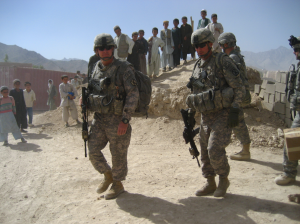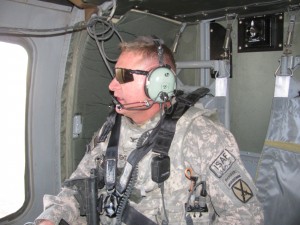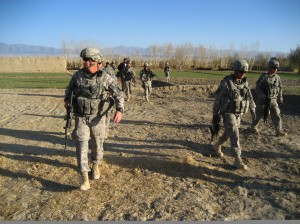Colonel David B. Haight, who was recently appointed as the Commandant of the U.S. Army Infantry schools at Ft. Benning, Georgia, began his military career with the BYU Army ROTC.
Haight, a distant relative to LDS apostle David B. Haight who died in 2004, met life long friends while at BYU.
One of his fellow ROTC cadets, Frank Montoya has been a friend of Haight’s since they were freshman more than 30 years ago. Montoya, who is now a national counterintelligence executive special agent, calls Haight “one of the best men I have ever known.”

“I first met him during an ROTC leadership lab when we were freshmen in 1980,” Montoya explained. “I could tell that first day he was a natural leader. Leaders are not born, but some people just have a gift when it comes to inspiring, motivating and leading. (Haight) is one of those people. I realized then that aspiring to be like him, and those like him, would take me far in life. It has.”
Haight, a three-time Bronze Star recipient, has been a warrior and student in the Army his entire career. He graduated from Airborne School and Ranger School. He went through the Infantry Officer basic and advanced courses, earned his Expert Infantryman’s Badge and received master’s degrees from the U.S. Naval Command in National Security and Strategic Studies and from the Staff College and the U.S. Army War College in Strategic Studies.
From December 2008 to December 2009, Haight led the entire 3rd Brigade Combat Team, “Spartan Brigade,” of the 10th Mountain Division in Afghanistan in Operation Enduring Freedom.
His brigade fought in many of the most dangerous places in Afghanistan, expelling Taliban resistance from the area.
“I am most proud of the facts that my Army allowed me to command on many occasions some of nation’s finest infantry units in combat,” Haight said. “And finally taking Wardak and Logar provinces from the Taliban and giving them back to the Afghan people.”
Haight, a highly decorated officer, is not the lone soldier in his family. His father, the late Price Haight, retired as a Lieutenant colonel from the artillery branch in the Army after serving in World War II, Korea and Vietnam.
“As the child of a career Army officer, I was interested in joining the Army,” Haight said. “As a kid, it was observing the little things — seeing the MP salute the car as we drove through the gates at Ft. Belvoir, seeing the Changing of the Guard at the Tomb of the Unknowns at Arlington, seeing the Spirit of ’76 presentation, military bands and parades — all were interesting to me.”
All of Haight’s brothers followed in their father’s footsteps, serving in various braches of the Armed forces during many of the nation’s conflicts. The family’s next generation seems determined to do the same. Haight’s own son, David Jr., has served two tours to Afghanistan with the 1st Ranger Battalion.
Haight’s wife, Bonnie, said she often hears others say, “He is a soldier’s soldier.”
“He is a warrior, loves his family and country and would die for them,” Bonnie Haight said.
Col. Haight said he chose the Infantry because of his competitive nature.

“I thought that if I’m going to do this, I want to serve at the very tip of the spear.”
Haight said his greatest sacrifice has been being apart from his family.
“I think the worst one was having to call my wife from Baghdad on our 20th anniversary and tell her, ‘Happy anniversary, but this isn’t the way I would have planned it,’ while enemy tracer rounds flew through the night,” Haight said.
Montoya said Haight’s sacrifices have helped pull our country through past and current conflicts.
“The last decade has been among the toughest in our nation’s history,” Montoya said. “Men like (Haight), their many sacrifices, their technical and tactical competence and their love of country have seen us through the times stronger than ever. We all owe him a tremendous debt.”
Haight has commanded troops as he served as a rifle platoon leader, executive officer, liaison officer and operations officer at the company and battalion level. He has commanded two companies, two battalions and a combat brigade.
Lt. Col. Matt McFarlane has served with Haight several times over the course of their careers and attributes much of Haight’s success to his ability to communicate and mentor.
“He has a unique ability to communicate very well with all ranks, from private to general,” McFarlane said. “He uses metaphors to emphasize his points and provide a perspective that allows people to understand his intent for the organization.”
McFarlane said Haight can simplify highly complex matters to a simple explanation and over the years has become a more strategic leader who empowers his soldiers.
“As he leads larger and larger organizations, this ability enables him to articulate a purpose and intent better than anyone I have seen in the Army,” McFarlane said.
Haight’s ability to lead soldiers into battle has been key in his success and the success of his soldiers’ missions and has garnered him respect and loyalty throughout the ranks.
He fought in Honduras during Operation Gold Pheasant in 1988. He led his soldiers in Panama in Operations Just Cause and Safe Haven from 1989 to 1990 and again in 1995.
Since 9/11 Haight has led battalions and a brigade in Iraq and Afghanistan on combat missions and special operation missions.
His first post-9/11 deployment was to Iraq with the 2nd battalion, 325th Airborne Infantry Regiment of the 82nd Airborne Division from March 2003 to January 2004. From there he took command of and led the 2nd Ranger Battalion of the 75th Ranger Regiment on several combat tours to Iraq and Afghanistan from 2004 to 2006.
McFarlane served with Haight through several of these deployments and in the process captured Muhammad Khalif Shakara, the number-two Al Qaeda terrorist in Iraq.
“He led a task force very well by empowering all those in the unit to be innovative and work together to identify, target and capture a very violent and dangerous man,” McFarlane said. “A great number of organizations were looking for this terrorist for a very long time, and Col. Haight’s leadership, focus and patience while empowering those around him enabled the unit to succeed.”

Success does not come without a cost in war. One of the most difficult trials of being a leader is losing soldiers in battle.
“I tried to make all my soldiers understand that they were a crucial member of a very important and high-performing team,” Haight said. “While accomplishing the mission, I brought home safely as many as I could. And for those KIA, I tried to make it matter each day and honor them by never forgetting them, taking care of their families and winning on the battlefield for them each and every day.”
And it is not just soldiers who have made sacrifices for their country.
The Haight family has moved 15 times, and amid training and deployments many birthdays, graduations, anniversaries, holidays and sporting events have been missed.
“Our children have been uprooted from friends and family and have had to attend many different schools,” Bonnie Haight said. “They have always been the new kid.”
Haight said outside the Army, he is most proud of his family.
“(Bonnie and I) provided well and raised four fabulous children that have all been successful contributors to society,” Haight said. “They turned out to be much better children than I was a father.”
Bonnie Haight has also sacrificed much of her time in volunteer positions for the Army. She had held leadership and senior adviser positions in the Family Readiness Group (FRG) of Haight’s units to aid soldiers and their families.
“The FRG jobs are strictly volunteer, and sometimes the work was 40 hours a week and sometimes very exhausting,” Bonnie Haight said. “It was crucial, however, that the families in each of the units were taken care of.”
Over the many years of her husband’s career, she has been awarded over twenty awards for her volunteer service, including the Department of the Army Outstanding Civilian Service Medal.
Bonnie Haight said her husband gladly sacrifices what he does to be a loyal soldier and father.
“His subordinates know that he will not ask them to do anything he wouldn’t do, and they also know that he is fair,” Bonnie Haight said. “They would follow him into combat and die for him; many have, and some have done both. Apart from the Army, he puts his family first, sacrificing his interests and sleep to make sure his children know they are important to him.”
After Haight relinquished brigade command in 2010, he served at the highest level of the Armed Forces when he became the Executive Assistant to Chairman of the Joints Chiefs of Staff Admiral Mike Mullen at the Pentagon. He then went on to become Deputy Director of the Pakistan-Afghanistan Coordination Cell before taking his Commandant position over the Infantry Schools, a brigadier general billet.
“Every duty position he has held during these years has impacted thousands of soldiers in one way or another,” McFarlane said. “Additionally, his professionalism and experience-based knowledge was sought out by the highest levels of the Department of Defense as they created policy that impacts our National Security establishment today. He was selected to lead the Infantry Branch and ensure the largest combat branch in the Army captures all of the lessons learned over the last decade of war and incorporates those lessons into doctrine and development of the force — a very important job for the foot soldiers in today’s dangerous world.”
Based on past history of the Army’s former Infantry School Commandants, Haight is on his way to pinning on a star and joining the small handful of BYU Army ROTC graduates who have reached the rank of a general officer.




